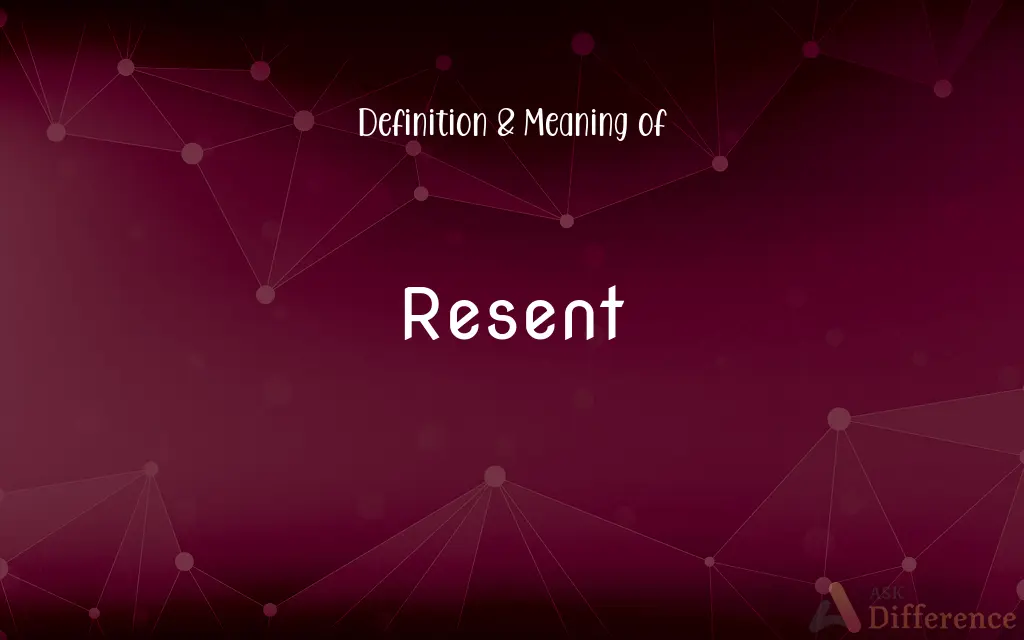Resent Definition and Meaning
Edited by Tayyaba Rehman — By Fiza Rafique — Updated on March 6, 2024
Resent means to feel bitterness or indignation at having been treated unfairly. e.g., She resented being overlooked for the promotion.

Table of Contents
Resent Definitions
To harbor feelings of displeasure or hostility towards someone or something.
She resented her colleague for taking credit for her work.
To feel bitterness or anger over a perceived injustice.
He resented the fact that he had to work late.
To feel injured or insulted by an action or remark.
They resented the offhand comment made by their supervisor.
To hold a grudge against someone for a past action.
He resented his friend for betraying his trust years ago.
To take offense at or be annoyed by.
He resented the intrusive questions about his private life.
To exhibit anger or bitterness towards something that interferes with one's preferences or rights.
He resented the new policy that limited his freedom.
To begrudge someone for having something.
She resented her sister for her natural talent in music.
To feel dissatisfaction with a situation imposed upon oneself.
He resented having to follow such strict rules.
To envy someone's success or happiness.
They resented their neighbors for their lavish lifestyle.
To be reluctant or unwilling to accept something.
She resented the idea of starting over in a new city.
To feel indignantly aggrieved at.
(transitive) To feel resentment over; to consider as an affront.
The bride greatly resented being left at the church.
(transitive) To express displeasure or indignation at.
To be sensible of; to feel.
In a positive sense, to take well; to receive with satisfaction.
(obsolete) To recognize; to perceive, especially as if by smelling; -- associated in meaning with sent, the older spelling of scent, to smell. See resent (intransitive verb).
(obsolete) To give forth an odor; to smell; to savor.
Simple past tense and past participle of resend
The package was resent, this time with the correct postage.
To be sensible of; to feel
Which makes the tragical ends of noble persons more favorably resented by compassionate readers.
In a bad sense, to take ill; to consider as an injury or affront; to be indignant at.
To express or exhibit displeasure or indignation at, as by words or acts.
The good prince King James . . . bore dishonorably what he might have resented safely.
To feel resentment.
To give forth an odor; to smell; to savor.
The judicious prelate will prefer a drop of the sincere milk of the word before vessels full of traditionary pottage resenting of the wild gourd of human invention.
Feel bitter or indignant about;
She resents being paid less than her co-workers
Wish ill or allow unwillingly
Resent Snonyms
Bear a grudge
To continue feeling an old resentment for someone.
She's been bearing a grudge against her coworker for years.
Feel aggrieved
To feel wronged or offended.
He felt aggrieved by the unfair treatment.
Be offended by
To feel hurt, angry, or upset by something.
He was deeply offended by the false accusations.
Feel indignant
To feel or show anger or annoyance at what is perceived as unfair treatment.
She felt indignant about the conditions of employment.
Begrudge
To envy (someone) the possession or enjoyment of (something).
She begrudged him his success.
Take umbrage
To feel offended or annoyed by something.
She took umbrage at his remarks.
Hold resentment
To keep feeling anger toward someone for past slights or wrongs.
He holds resentment towards his rival.
Dislike
To feel distaste for or hostility toward.
He dislikes being the center of attention.
Harbor ill feelings
To keep bad thoughts about someone.
He harbors ill feelings towards his former employer.
Feel bitter
To have or show feelings of bitterness or resentment.
He felt bitter about the way things turned out.
Resent Idioms & Phrases
Resent every moment
To feel bitterness or anger about every aspect of a situation.
She began to resent every moment she had to spend working under him.
Quietly resent
To harbor resentment without openly expressing it.
He quietly resent the fact that his suggestions were always ignored.
Resent the comparison
To be offended by being compared to someone or something else.
He began to resent the comparison to his more successful sibling.
Resent the notion
To be offended by a particular idea or suggestion.
She resent the notion that she needed help to succeed.
Openly resent
To clearly and publicly show one's bitterness or anger.
They openly resent the new regulations imposed by the management.
Resent the intrusion
To be upset or annoyed by someone's unwelcome involvement.
He grew to resent the intrusion of his work into his personal life.
Bitterly resent
To feel intense bitterness or anger.
She bitterly resent the unfair treatment she received.
Resent the implication
To be offended by a suggestion or insinuation.
I resent the implication that the mistake was my fault.
Silently resent
To harbor resentment without voicing it.
She silently resent having to always clean up after others.
Resent the assumption
To be offended by a presumption made by others.
I resent the assumption that I wouldn't understand the technical details.
Deeply resent
To feel a profound sense of bitterness or anger.
He deeply resent the way his contributions were minimized.
Resent the pressure
To be upset about being pressured into doing something.
She began to resent the pressure to conform to their expectations.
Resent the oversight
To be upset about being overlooked or ignored.
They resent the oversight when they weren't invited to the meeting.
Visibly resent
To clearly show one's bitterness or anger through one's actions or expressions.
He visibly resent being passed over for the promotion.
Strongly resent
To feel a strong bitterness or anger towards something or someone.
He strongly resent the accusations made against him.
Resent the burden
To be upset about being given a heavy responsibility or task.
She grew to resent the burden of managing both work and home.
Resent the favoritism
To be upset about unfair preferential treatment given to others.
The team began to resent the favoritism shown to certain members.
Internally resent
To feel resentment inside oneself without expressing it outwardly.
He internally resent the constant demands placed on him.
Resent the intrusion of privacy
To be upset about someone invading one's personal space or privacy.
They resent the intrusion of privacy when their emails were read without consent.
Resent the disruption
To be upset about an interruption or disturbance.
They resent the disruption caused by the noisy construction nearby.
Resent Example Sentences
They resent the fact that they were not consulted about the changes.
She began to resent her colleague's constant interruptions.
Over time, she grew to resent him for taking her efforts for granted.
I resent having to explain my decisions to them.
He could resent the new policy, but it wouldn't change anything.
She couldn't help but resent the way they treated her.
They resent being left out of the decision-making process.
He didn't want to admit it, but he could feel himself starting to resent the extra workload.
I resent the implication that I'm not capable of handling this.
He began to resent the time he spent commuting.
They might resent the comparison, but it was apt.
She secretly resent their success.
You could tell he resent having to stay late.
I resent the notion that we're not doing our best.
Many locals resent the influx of tourists during the summer months.
Common Curiosities
What is a stressed syllable in resent?
The stressed syllable in "resent" is the second syllable: -sent.
How is resent used in a sentence?
He resented the fact that he was always overlooked for promotions.
How many syllables are in resent?
There are two syllables in "resent."
What is the first form of resent?
The first (base) form is "resent."
What is the root word of resent?
The root of "resent" comes from the Old French "ressentir," which means to feel again, strongly.
Why is it called resent?
It's called "resent" because it comes from the French word "ressentir," meaning to feel strongly, reflecting the deep emotions involved in feeling wronged or slighted.
How do we divide resent into syllables?
Resent is divided into syllables as re-sent.
What is the second form of resent?
The second (past simple) form is "resented."
What is the third form of resent?
The third (past participle) form is "resented."
What is the verb form of resent?
"Resent" itself is the base verb form.
What is the pronunciation of resent?
Resent is pronounced as /rɪˈzɛnt/.
What part of speech is resent?
"Resent" is a verb.
What is the plural form of resent?
As a verb, "resent" does not have a plural form. Its action can apply to singular or plural subjects.
Is resent an abstract noun?
"Resent" is a verb, not a noun, so it cannot be classified as abstract or concrete.
Is resent a negative or positive word?
"Resent" is considered a negative word as it conveys feelings of bitterness or anger.
Is the word resent Gerund?
The gerund form of "resent" is "resenting," which acts as a noun.
Which determiner is used with resent?
Determiners like "the" or "this" can be used with "resent" when it's used in a sentence, e.g., "She resented the implication."
What is the singular form of resent?
"Resent" remains unchanged as it is a verb; its singular form is "resent."
Is resent a vowel or consonant?
The word "resent" starts with a consonant.
Is the resent term a metaphor?
"Resent" can be used metaphorically to describe deep-seated feelings of injustice or unfair treatment.
Is the word resent imperative?
"Resent" can be used in the imperative mood as a command, e.g., "Do not resent the criticism."
Is the word “resent” a Direct object or an Indirect object?
"Resent" as a verb can have a direct object, e.g., "She resented the remark." The thing being resented would be the direct object.
Which vowel is used before resent?
Typically, no specific vowel is used before "resent," but an article like "a" or "the" can precede it in a sentence.
Which conjunction is used with resent?
Conjunctions such as "and," "but," or "because" can be used with "resent" to connect it to other ideas in a sentence, e.g., "She resented him because he was always late."
What is another term for resent?
Another term for "resent" is "begrudge."
What is the opposite of resent?
The opposite of "resent" could be "appreciate" or "welcome."
Which preposition is used with resent?
Prepositions like "for" or "about" are commonly used with "resent," depending on the context, e.g., "He resented her for taking all the credit."
Is resent a noun or adjective?
"Resent" is a verb.
Is resent an adverb?
"Resent" is not an adverb.
Is resent a countable noun?
"Resent" is primarily a verb and not a noun, so it does not have a countable or uncountable form.
Is resent a collective noun?
"Resent" is not a collective noun.
Which article is used with resent?
The definite article "the" or the indefinite article "a" can be used with "resent" in a sentence, depending on the context.
Share Your Discovery

Previous Term
Consider Definition and Meaning
Next Term
Achieve Definition and MeaningAuthor Spotlight
Written by
Fiza RafiqueFiza Rafique is a skilled content writer at AskDifference.com, where she meticulously refines and enhances written pieces. Drawing from her vast editorial expertise, Fiza ensures clarity, accuracy, and precision in every article. Passionate about language, she continually seeks to elevate the quality of content for readers worldwide.
Edited by
Tayyaba RehmanTayyaba Rehman is a distinguished writer, currently serving as a primary contributor to askdifference.com. As a researcher in semantics and etymology, Tayyaba's passion for the complexity of languages and their distinctions has found a perfect home on the platform. Tayyaba delves into the intricacies of language, distinguishing between commonly confused words and phrases, thereby providing clarity for readers worldwide.

































